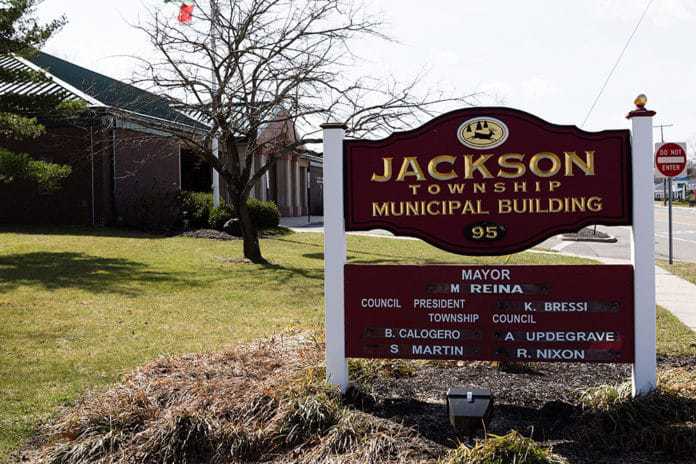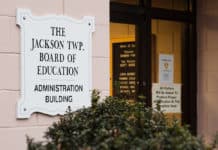
JACKSON – Mayor Michael Reina described it as a straight forward, easy to understand spending plan. His remarks concerned a proposed municipal budget that proposes a 1.74% tax increase.
This translates to a $20.86 per year increase in taxes for the average home owner assessed at $326,823.
Residents at that council meeting were able to follow along with a print out of a PowerPoint budget presentation that they watched and which Business Administrator Helene Schlegel narrated.
“This is only the municipal portion of your tax bill,” Schlegel reminded residents. It would not include school or county taxes, for example. She added that public safety (police and emergency services) represented the highest portion of expenses.
“The tax burden is falling on residential home owners. We are seeking clean ratables to take away some of that burden. The mayor has been working on that. We have made some progress on that since last year,” Schlegel said.
“The administration deserves a lot of credit for this budget,” Council President Kenneth J. Bressi said later in the meeting. He added that several non-residential properties would soon be breaking ground and that “our commercial properties are up by 23 percent this year. Things are improving.”
Council Vice President Robert Nixon also commended the budget, saying that despite the increase the spending plan supports “an amazing expanded police department, senior services, clean streets and a lean and mean staff. We are an extremely well-run municipality.”
“Jackson can’t make up its own rules. The state dictates a budget process. It is not our choice. We have to live under that process,” Schlegel added.
The Department of Community Affairs approves all municipal budgets and reviews financial statements and audits. The municipal budget has two principal components which include an operating budget and a capital budget.

Schlegel explained the budget is organized into two expense categories “salary and wages and operating expenses.” The budget must always balance revenues and expenses.
She reminded residents that the township collects taxes for the county, school district and township itself. It then doles out the school and county’s shares. Counties and schools receive 100 percent of what is anticipated, whether collected or not while municipalities cover any gap with dollars from “reserve for uncollected taxes.” In other words, all towns in New Jersey have to tax a little more to make up for anyone who did not pay their taxes so that the school and county get their fair share.
The fiscal year for the state runs from July 1 through June 30 which is the same for School Boards while the township’s fiscal year runs from Jan. 1 to Dec. 31.
The process includes the mayor and administrator submitting the budget and the council, approving it by a majority vote. It is then submitted to the state for examination and final approval.
“The municipal portion of the total tax levy cannot increase more than 2 percent from the prior year,” Schlegel said. Certain appropriations are excluded from that calculation including debt service.

Business Administrator Helene Schlegel discusses the proposed budget which she helped draft during a recent Jackson Council Meeting. (Photo by Bob Vosseller)
The allowable operating appropriations (expenses) of the current fund portion of the municipal budget cannot increase greater than 2.5% from the previous year. Year to year budget appropriation increases that are under the cap can be “banked” and saved for use in the subsequent two years.
Comparing this year’s budget to last year’s, Schlegel told attendees of the meeting that miscellaneous revenue exceeded the budget totals by $266,726.91 in 2017 which included an increase in fees and permits, municipal court fines, interest on investments and deposits. Unanticipated revenue was $1,679,640.77 and included a reimbursement from FEMA (Federal Emergency Management Agency) ABC (Alcohol Beverage Commission) and tower rental fees.
In 2016, $41,792,708.61 was budgeted. That figure last year was $42,398,789.27 which is a $606,080.66 increase. In 2016, $39,749,685.56 was expended and in 2017, $40,609,196.22 was expended marking an increase of $859,510.66.
“This (2018) budget has no gimmicks,” Schlegel said. She explained that gimmicks to be avoided include onetime revenues, pension deferrals, school tax deferrals, cap waivers, fiscal year debt and extraordinary aid.
“This is a totally clean budget with no exclusions. It is 100 percent pure,” Schlegel said. The total budget is $44,173,657.09. Last year’s municipal tax levy included $31,800,458.30 with the 2018 proposed budget requiring $32,354,549.88 in taxes, noting a change of 1.74 percent. The municipal tax rate will be going from 47.3 cents per $100 of assessed valuation in 2017 to 47.9 cents per $100 this year, noting a change of 1.3%.
Resident Denise Garner questioned why the council had voted to approve a temporary budget during the meeting which Schlegel and Township Attorney Jean Cipriani explained was standard practice and was unrelated to the proposed spending plan.
“It is not an emergency but it is worded that way for every municipality. It is common practice,” Cipriani said of the temporary budget passed prior to the 2018 budget presentation.
The proposed budget will have a public hearing on April 24 at Township Hall.






